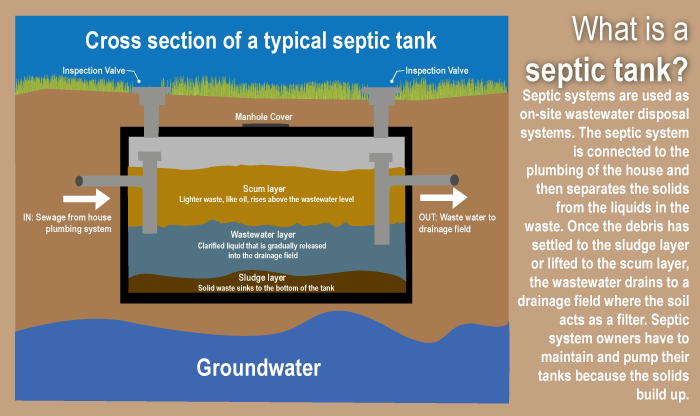
Photo Illustration: Amanda Proscia
The Environmental Protection Agency says it’s time to celebrate septic systems with their very own week.
But it’s the septic tanks themselves that could be the party pooper of their own celebration. Septic systems are a significant cause of water contamination in Michigan waterways, experts say.
One hundred percent of 64 rivers tested in Michigan’s Lower Peninsula tested positive for fecal matter, according to a recent Michigan State University study. It found a direct correlation between the number of septic tanks in an area and the amount of bacteria and pathogens from human sewage in nearby rivers, said Joan Rose, a Michigan State University water expert who led the study.
“We don’t know if the bacteria is from failing septic tanks or from the soil just not filtering out the microbes of bacteria,” said Rose.
Septic tanks are on-site wastewater disposal systems used in areas without sewer systems connected to treatment plants. They are connected to the plumbing of the house and separate solids and liquids to create wastewater that is drained through soil like a filter.
At least that’s what is supposed to happen.
But the Michigan study found such problems as at the Maple River, which runs through central Michigan, that had a bacteria content so high that it wasn’t safe for recreational use, according to Jonathon Beard, a consultant specializing in water quality for Public Sector Consultants, a Lansing, Michigan-based policy group.
Experts recently brought dogs trained to track sewage by scent to the river to identify if the fecal matter in the river was human.
“The dogs just say yes or no, they don’t tell us how much,” said Beard. About 80 percent of the samples that the dogs identified tested positive for human fecal matter, Beard said.
The preliminary results point to a pressing problem in Michigan — the lack of regulation of septic systems, Beard said.
Michigan is the only state in the U.S. without a uniform statewide code regulating septic tanks.
“It’s embarrassing for the state that we’re the only ones without a septic code,” said Sean Hammond, deputy policy director for the Michigan Environmental Council.
Michigan leaves septic regulations up to local health departments.
“At a minimum, septic tanks are inspected when they are installed,” Beard said. “In many counties that’s the only point where they are required to be looked at.”
The fragmentation of septic system policies is the biggest challenge facing Michigan’s water quality, Rose said. “One county can be doing great, progressive things and the one right next to it can be doing absolutely nothing — it doesn’t let us prioritize where to put our money first.”
Some local organizations, like the Clinton County Conservation District, educate septic tank owners about how to properly pump and maintain the systems, said Jon Switzer, the executive director of that group.
“Regulation could feel intrusive to homeowners,” Switzer said. “But at the same time, we’re talking about human waste in our water — people need to be more proactive.”
Most homeowners don’t think about getting their septic tank inspected, Beard said.

Most statewide codes require regular pumping of septic tanks. Image: Evironmental Protection Agency
“It’s out of sight and out of mind, as long as things flow down the sink, they’re not going to think about it,” he said. “But just like any other piece of infrastructure, it requires maintenance from time to time.”
Options for regulation
“There are a range of tools out there,” Beard said.
In 11 of Michigan’s 83 counties, septic systems are inspected every time a property is sold, he said.
But all counties should do that, Hammond said. “We think state-wide point of sale inspection would be pretty good.”
Another option: requiring that all septic systems be checked periodically.
Experts suggest taking Ohio’s Environmental Protection Agency’s (OEPA) strategy for creating a loan fund for qualifying homeowners with failing septic systems to repair or replace the system. The OEPA made $5 million available for the loan fund, according to a press release.
“Repairs could cost up to $16,000 — no one wants to be pushed out of their home because of a failing septic system,” said Beard.
All options are on the table, but nothing has been introduced by state lawmakers this session, Hammond said.
Septic Setbacks
Michigan lawmakers have unsuccessfully proposed septic regulation in the past, Switzer said. “It’s a pretty politically sensitive topic.”
“It’s been a long going debate in Lansing, and has been for years,” Hammond said.
Septic system regulation involves so many different groups that it gets “very complicated” trying to appease them all, Hammond said. “Comprehensive reform legislation is always going to be difficult to get through.”
The main resistance comes from real estate sales associations, Hammond said, especially if the proposed regulation is at the point of sale.
“It just adds one more thing to the list that has to be done once a house is sold,” he said.
Another obstacle to septic tank regulation is the lack of a centralized database that indicates their locations, experts said.
Since the system is fragmented, every county has its own index of how many septic tanks it has, Hammond said. “There needs to be a centralized database of how many there are, what condition they’re in and what’s coming out of them.”
Since lawmakers have yet to propose a uniform septic system regulation for the state, clean water advocates are optimistic that if they ever do it will significantly improve Michigan waterways.
“If we do regulation right, we can have abundant and clean water in 30 or 40 years,” Rose said.
Click here for pointers on maintaining septic systems.
Related stories:
Bill would restrict septic waste disposal bans, cut costs